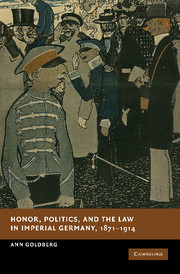5 - Popular mobilizations: Jews and lunatics
Published online by Cambridge University Press: 03 May 2010
Summary
In the early twentieth century, in the tiny town of Reppen near Frankfurt/Oder, a Jewish merchant from Berlin, Spiegel, was standing in a courtroom before a local magistrate when the latter, pointing at Spiegel, turned to his clerk and asked with disdain, “So what does this Jew want?” Mortified, Spiegel did what any self-respecting German would have done: he sued, rushing home to employ the services of the famous Berlin defense attorney Fritz Friedmann. Spiegel got his insult trial, but in a place like Reppen it had the feel of a rigged Jim Crow courtroom. The antisemitic community was outraged at the affrontery of the suit, and Spiegel, probably sensing trouble, skipped the trial altogether, sending his lawyer in his stead. Entering the courtroom on the day of the trial, Friedmann had a portent of things to come when he found the defendant (the town's judge) socializing in a backroom with the judge-juror panel presiding over the case. The mood in the courtroom and in the town was so menacing that, after the case was dismissed, Friedmann, himself a Jew and fearing for his life, fled in the first train back to Berlin.
Spiegel's reaction to an insult made sense given the honor culture in which he lived. But the basis of his lawsuit was something new and, in a place like Reppen, controversial: antisemitism. Filing such a suit presupposed an inherent Jewish claim to dignity and the right to defend it in law.
- Type
- Chapter
- Information
- Honor, Politics, and the Law in Imperial Germany, 1871–1914 , pp. 157 - 192Publisher: Cambridge University PressPrint publication year: 2010



